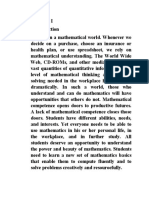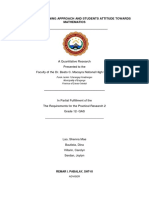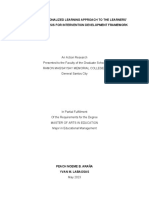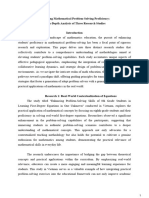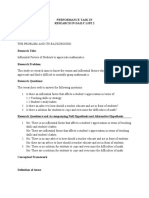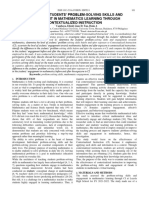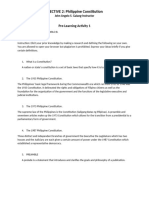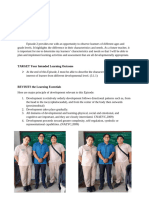Kenneth Notecard Rrs & RRL
Kenneth Notecard Rrs & RRL
Uploaded by
masangcayjayceeCopyright:
Available Formats
Kenneth Notecard Rrs & RRL
Kenneth Notecard Rrs & RRL
Uploaded by
masangcayjayceeOriginal Title
Copyright
Available Formats
Share this document
Did you find this document useful?
Is this content inappropriate?
Copyright:
Available Formats
Kenneth Notecard Rrs & RRL
Kenneth Notecard Rrs & RRL
Uploaded by
masangcayjayceeCopyright:
Available Formats
NOTE CARD REVIEW RELATED LITERATURES AND STUDIES
Details about the author (Type, title, author, etc.)
Title of Work : Subtypes of Mathematical Difficulties and their Stability
Author: Chan, Winnie Wait Lan, Wong, Terry Tin-Yau
Publisher: Journal of education psychology
Type: Research Article
Place and Year of Publication: place not stated, 2020
Topic: Mathematical Difficulties and their Stability
Summary:
This study aimed to identify and understand the different subtypes of mathematical
difficulties in children and how stable these subtypes are over time. Using cluster analyses,
researchers identified five distinct subtypes of mathematical difficulties among elementary
school children: number sense deficit, numerosity coding deficit, symbolic deficit, working
memory deficit, and a mild difficulty group.
Hypothesis:
This research is that there are distinct subtypes of mathematical difficulties among
children, each characterized by specific cognitive deficits, and that these subtypes will show
varying degrees of stability over time.
Methodology:
The study focused on children experiencing mathematical difficulties during the first 2
years of elementary school. Specific criteria for inclusion and sample size details were likely
outlined.
Findings:
The findings highlight the importance of understanding these subtypes to develop
targeted intervention strategies. Tailored approaches can be designed to address the specific
cognitive challenges faced by each subtype and to build upon their strengths, ultimately
aiming to improve mathematical learning outcomes for each child.
Errors/strengths and weaknesses of the literature/studies:
The study focuses on the first 2 years of elementary school, which may not capture
the full range of developmental changes in mathematical difficulties. Longer-term studies
could provide a more comprehensive.
Submitted by: Ian Kenneth Maniquiz Group: 2
Grade & Section: 12 STEM AQUARIUS
NOTE CARD REVIEW RELATED LITERATURES AND STUDIES
Details about the author (Type, title, author, etc.)
Title of Work : Mathematics Performance on Integers of Students with Mathematics Difficulties
Author: Diane Pedrotty Bryant
Publisher: The Journal of Mathematical Behavior
Type: Research Articles
Place and Year of Publication: no place indicated, 2020
Topic: Mathematics Performance on Integers of Students with Mathematics Difficulties
Summary:
This study evaluated the impact of an integer module intervention on 7th grade students
with mathematics difficulties. A total of 908 students were randomly assigned to either a
treatment group, which received the integer module lessons, or a control group.
Hypothesis:
7th grade students with mathematics difficulties who receive the integer module
intervention will show greater improvements in their mathematics performance compared to
students who do not receive the intervention.
Methodology:
The study discussed the implications of the findings, including the effectiveness of the
intervention and the positive feedback from both students and interventionists.
Findings:
Students in the treatment group, who received the integer module intervention,
demonstrated significantly greater improvements in their mathematics performance compared
to students in the control group. The analysis revealed an average slope estimate of β = 0.61
with a significance level of p = 0.004, indicating that the intervention had a positive effect on
performance gains.
Errors/strengths and weaknesses of the literature/studies:
With 908 students participating, the study benefits from robust statistical power and
greater generalizability of the findings. Randomizing entire classes to treatment or control
conditions helps control.
Submitted by: Ian Kenneth Maniquiz Group: 2
Grade & Section: 12 STEM AQUARIUS
NOTE CARD REVIEW RELATED LITERATURES AND STUDIES
Details about the author (Type, title, author, etc.)
Title of Work: Primary Teacher Attitudes towards Productive Struggle in Mathematics in
Remote Learning versus Classroom-Based Settings
Author: Janette Bobis
Publisher: MDPI
Type: Research Article
Place and Year of Publication: Australia, 2021
Topic: Primary Teacher Attitudes towards Productive Struggle in Mathematics in Remote
Learning versus Classroom-Based Settings
Summary:
The study explored how Australian early years primary teachers perceive student struggle in
mathematics learning within remote versus classroom settings. Using a mixed-methods
approach, the study found that teachers viewed student struggle more favorably in classroom
settings than in remote ones.
Hypothesis:
Teachers perceive the value of student struggle in mathematics learning to be higher in
classroom settings compared to remote learning settings due to challenges related to
synchronous teacher facilitation, parental attitudes, social interaction, and access to
materials.
Methodology:
The study involved 82 Australian early years primary teachers who were part of a
professional learning initiative focused on teaching mathematics through challenging tasks.
Findings:
Teachers expressed a more favorable attitude towards the value of student struggle
in traditional classroom settings compared to remote learning environments.
Errors/strengths and weaknesses of the literature/studies:
The study addresses a timely issue by comparing teacher attitudes towards student struggle
in remote and classroom settings, which is particularly relevant given the recent shift to online
learning environments.
Submitted by: Ian Kenneth Maniquiz Group: 2
Grade & Section: 12 STEM AQUARIUS
NOTE CARD REVIEW RELATED LITERATURES AND STUDIES
PARAGRAPH
In 21 January 2021 the MDPI published article an title Primary
Teacher Attitudes towards Productive Struggle in Mathematics in
Remote Learning versus Classroom-Based Settings. The study explored
how Australian early years primary teachers perceive student struggle in
mathematics learning within remote versus classroom settings. Using a
mixed-methods approach, the study found that teachers viewed student
struggle more favorably in classroom settings than in remote ones.
Teachers perceive the value of student struggle in mathematics learning
to be higher in classroom settings compared to remote learning settings
due to challenges related to synchronous teacher facilitation, parental
attitudes, social interaction, and access to materials. The study involved
82 Australian early years primary teachers who were part of a
professional learning initiative focused on teaching mathematics
through challenging tasks. Teachers expressed a more favorable attitude
towards the value of student struggle in traditional classroom settings
compared to remote learning environments. The study addresses a
timely issue by comparing teacher attitudes towards student struggle in
remote and classroom settings, which is particularly relevant given the
recent shift to online learning environments
NOTE CARD REVIEW RELATED LITERATURES AND STUDIES
PARAGRAPH
In 2020 the journal of mathematical behavior published articles an titled
Mathematics performance on integers of students with mathematics
difficulties the articles identify This study evaluated the impact of an
integer module intervention on 7th grade students with mathematics
difficulties. A total of 908 students were randomly assigned to either a
treatment group, which received the integer module lessons, or a control
group. the articles discuss 7th grade students with mathematics
difficulties who receive the integer module intervention will show
greater improvements in their mathematics performance compared to
students who do not receive the intervention. The study discussed the
implications of the findings, including the effectiveness of the
intervention and the positive feedback from both students and
interventionists. Students in the treatment group, who received the
integer module intervention, demonstrated significantly greater
improvements in their mathematics performance compared to students
in the control group. The analysis revealed an average slope estimate of
B = 0.61 with a significance level of p=0.004, indicating that the
intervention had a positive effect on performance gains. With 908
students participating, the study benefits from robust statistical power
and greater generalizability of the findings. Randomizing entire classes
to treatment or control conditions helps control.
NOTE CARD REVIEW RELATED LITERATURES AND STUDIES
PARAGRAPH
In Apr 2020, the research of The journal of mathematical behavior
pablished article an title Mathematical difficulties and their
stability.This study aimed to identify and understand the different
subtypes of mathematical difficulties in children and how stable these
subtypes are over time. Using cluster analyses, researchers identified five
distinct subtypes of mathematical difficulties among elementary school
children: number sense deficit, numerosity coding deficit, symbolic
deficit, working memory deficit, and a mild difficulty group.This
research is that there are distinct subtypes of mathematical difficulties
among children, each characterized by specific cognitive deficits, and
that these subtypes will show varying degrees of stability over time. The
study focused on children experiencing mathematical difficulties during
the first 2 years of elementary school. Specific criteria for inclusion and
sample size details were likely outlined.The findings highlight the
importance of understanding these subtypes to develop targeted
intervention strategies. Tailored approaches can be designed to address
the specific cognitive challenges faced by each subtype and to build
upon their strengths, ultimately aiming to improve mathematical
learning outcomes for each child.The study focuses on the first 2 years of
elementary school, which may not capture the full range of
developmental changes in mathematical difficulties. Longer-term studies
could provide a more comprehensive und
You might also like
- Relationships Between Mathematical Knowledge For Teaching and Teaching Practice: The Case of ProofNo ratings yetRelationships Between Mathematical Knowledge For Teaching and Teaching Practice: The Case of Proof7 pages
- Inquiry-Based Approach As Learning Enhancement of Grade 9 Students in Quadratic Equation: A Lesson StudyNo ratings yetInquiry-Based Approach As Learning Enhancement of Grade 9 Students in Quadratic Equation: A Lesson Study7 pages
- Effectiveness of Teaching Mathematics Using Manipulative Instructional MaterialsNo ratings yetEffectiveness of Teaching Mathematics Using Manipulative Instructional Materials68 pages
- ADUPROPOSALINCREASINGSTUDENTLEARNINGINMATHEMATICSTHROUGHTHEUSEKFCOLLABORATIVETEACHINGSTRATEGIESNo ratings yetADUPROPOSALINCREASINGSTUDENTLEARNINGINMATHEMATICSTHROUGHTHEUSEKFCOLLABORATIVETEACHINGSTRATEGIES8 pages
- DELA CRUZ, JUN P. "The Experience of Failing Students of Formerly Excelled in Mathematics: Case Studies." 2018No ratings yetDELA CRUZ, JUN P. "The Experience of Failing Students of Formerly Excelled in Mathematics: Case Studies." 20183 pages
- The Effect of Manipulatives on the Performance of Mathematical Problems in Elementary School ChildrenFrom EverandThe Effect of Manipulatives on the Performance of Mathematical Problems in Elementary School ChildrenNo ratings yet
- Sample Research Ojastro, Et Al 2017-2018No ratings yetSample Research Ojastro, Et Al 2017-201811 pages
- Cooperative Learning Approach and Students Attitude Towards MathematicsNo ratings yetCooperative Learning Approach and Students Attitude Towards Mathematics13 pages
- Metacognitive Journal: An Intervention Strategy in Enhancing Low-Achieving Student's Performance in Solving Functions and Perceptions Towards MathematicsNo ratings yetMetacognitive Journal: An Intervention Strategy in Enhancing Low-Achieving Student's Performance in Solving Functions and Perceptions Towards Mathematics8 pages
- Practical Application Activities in Mathematics100% (1)Practical Application Activities in Mathematics46 pages
- Metacognitive Strategies: Their Efffects To Academic Performance and Engagement100% (1)Metacognitive Strategies: Their Efffects To Academic Performance and Engagement21 pages
- Process Approach To Learning and Teaching Mathematics: Amalija ŽakeljNo ratings yetProcess Approach To Learning and Teaching Mathematics: Amalija Žakelj10 pages
- Academic Stress and Coping Strategies of Learning Mathematics Through Modular InstructionNo ratings yetAcademic Stress and Coping Strategies of Learning Mathematics Through Modular Instruction9 pages
- Difficulties in Learning Mathematics 1 The Problem and Its Background Introduction (TIOC)No ratings yetDifficulties in Learning Mathematics 1 The Problem and Its Background Introduction (TIOC)13 pages
- Peer Tutorial Program: Its Effect On Grade Seven (7) Grades in MathemathicsNo ratings yetPeer Tutorial Program: Its Effect On Grade Seven (7) Grades in Mathemathics23 pages
- Silva, Khrestan Reign G - Sysnthesis Paper - Prelim ExamNo ratings yetSilva, Khrestan Reign G - Sysnthesis Paper - Prelim Exam6 pages
- Synopsis of A Synthesis of Empirical Research On Teaching Mathematics To Low Achieving Students PDFNo ratings yetSynopsis of A Synthesis of Empirical Research On Teaching Mathematics To Low Achieving Students PDF3 pages
- Thesis Final Effectiveness of Worktext INo ratings yetThesis Final Effectiveness of Worktext I59 pages
- A Study To Develop and Implement Differentiated Hands On MathemaNo ratings yetA Study To Develop and Implement Differentiated Hands On Mathema49 pages
- The Impact of Blended Learning Approaches on GradeNo ratings yetThe Impact of Blended Learning Approaches on Grade8 pages
- The Effect of Flexible Small Groups On Math Achievement in FirstNo ratings yetThe Effect of Flexible Small Groups On Math Achievement in First10 pages
- Teaching Methods Paper # 2 Self-Monitoring and Graphic Organizers Matt Drabenstott 12/03/2015 SEDP 601 Virginia Commonwealth UniversityNo ratings yetTeaching Methods Paper # 2 Self-Monitoring and Graphic Organizers Matt Drabenstott 12/03/2015 SEDP 601 Virginia Commonwealth University12 pages
- Flipped Classroom Model: Effects On Performance, Attitudes and Perceptions in High School AlgebraNo ratings yetFlipped Classroom Model: Effects On Performance, Attitudes and Perceptions in High School Algebra13 pages
- Performance Task in Research in Daily Life 2 ResearchersNo ratings yetPerformance Task in Research in Daily Life 2 Researchers6 pages
- Secondary School Students ' Attitude Towards Mathematics Word ProblemsNo ratings yetSecondary School Students ' Attitude Towards Mathematics Word Problems11 pages
- Jaycee Masangcay (Fs1 - Learning Episode 2 Edited)No ratings yetJaycee Masangcay (Fs1 - Learning Episode 2 Edited)11 pages
- Catcat Notecard Rrs (Foreign) & RRL (Local) 2No ratings yetCatcat Notecard Rrs (Foreign) & RRL (Local) 24 pages
- Weekly Centralized Controler - Manual de Usuário (Inglês)No ratings yetWeekly Centralized Controler - Manual de Usuário (Inglês)24 pages
- PROGRESS&S-CURVE CIVILWORK Aug 11, 2015No ratings yetPROGRESS&S-CURVE CIVILWORK Aug 11, 201531 pages
- Outlier Innovations Private Limited Other Charges Invoice (Dec-2022)No ratings yetOutlier Innovations Private Limited Other Charges Invoice (Dec-2022)2 pages
- Cylindrical & Splitter Silencers For Fan Systems: Air MovementNo ratings yetCylindrical & Splitter Silencers For Fan Systems: Air Movement12 pages
- Mechanics of Materials II:: Thin-Walled Pressure Vessels and TorsionNo ratings yetMechanics of Materials II:: Thin-Walled Pressure Vessels and Torsion6 pages
- A Pandemic Tale of Two States: Boards Reshaped by State's Laws On DiversityNo ratings yetA Pandemic Tale of Two States: Boards Reshaped by State's Laws On Diversity60 pages
- 25+ Contoh Soal Bahasa Inggris Kelas 8 SMP MTs Semester GanjilNo ratings yet25+ Contoh Soal Bahasa Inggris Kelas 8 SMP MTs Semester Ganjil6 pages
- Export Preview - Digital Logistics Capacity AssessmentsNo ratings yetExport Preview - Digital Logistics Capacity Assessments7 pages
- Product Catalogue Drive Technology and CabsNo ratings yetProduct Catalogue Drive Technology and Cabs29 pages
- Bc. Zuzana Medvedíková 2 Basm English and Slovak Color Idioms100% (2)Bc. Zuzana Medvedíková 2 Basm English and Slovak Color Idioms5 pages
- Chapter Eight: Resistance Level of The DiodeNo ratings yetChapter Eight: Resistance Level of The Diode8 pages
- ICSE IV - ADAPTATIONS IN PLANTS - CH2 - WS01.pdf - Ic44001 PDFNo ratings yetICSE IV - ADAPTATIONS IN PLANTS - CH2 - WS01.pdf - Ic44001 PDF3 pages
- 2 Bat Reading - Comprehension - Text 2 TermNo ratings yet2 Bat Reading - Comprehension - Text 2 Term4 pages
- Relationships Between Mathematical Knowledge For Teaching and Teaching Practice: The Case of ProofRelationships Between Mathematical Knowledge For Teaching and Teaching Practice: The Case of Proof
- Inquiry-Based Approach As Learning Enhancement of Grade 9 Students in Quadratic Equation: A Lesson StudyInquiry-Based Approach As Learning Enhancement of Grade 9 Students in Quadratic Equation: A Lesson Study
- Effectiveness of Teaching Mathematics Using Manipulative Instructional MaterialsEffectiveness of Teaching Mathematics Using Manipulative Instructional Materials
- ADUPROPOSALINCREASINGSTUDENTLEARNINGINMATHEMATICSTHROUGHTHEUSEKFCOLLABORATIVETEACHINGSTRATEGIESADUPROPOSALINCREASINGSTUDENTLEARNINGINMATHEMATICSTHROUGHTHEUSEKFCOLLABORATIVETEACHINGSTRATEGIES
- DELA CRUZ, JUN P. "The Experience of Failing Students of Formerly Excelled in Mathematics: Case Studies." 2018DELA CRUZ, JUN P. "The Experience of Failing Students of Formerly Excelled in Mathematics: Case Studies." 2018
- The Effect of Manipulatives on the Performance of Mathematical Problems in Elementary School ChildrenFrom EverandThe Effect of Manipulatives on the Performance of Mathematical Problems in Elementary School Children
- Cooperative Learning Approach and Students Attitude Towards MathematicsCooperative Learning Approach and Students Attitude Towards Mathematics
- Metacognitive Journal: An Intervention Strategy in Enhancing Low-Achieving Student's Performance in Solving Functions and Perceptions Towards MathematicsMetacognitive Journal: An Intervention Strategy in Enhancing Low-Achieving Student's Performance in Solving Functions and Perceptions Towards Mathematics
- Metacognitive Strategies: Their Efffects To Academic Performance and EngagementMetacognitive Strategies: Their Efffects To Academic Performance and Engagement
- Process Approach To Learning and Teaching Mathematics: Amalija ŽakeljProcess Approach To Learning and Teaching Mathematics: Amalija Žakelj
- Academic Stress and Coping Strategies of Learning Mathematics Through Modular InstructionAcademic Stress and Coping Strategies of Learning Mathematics Through Modular Instruction
- Difficulties in Learning Mathematics 1 The Problem and Its Background Introduction (TIOC)Difficulties in Learning Mathematics 1 The Problem and Its Background Introduction (TIOC)
- Peer Tutorial Program: Its Effect On Grade Seven (7) Grades in MathemathicsPeer Tutorial Program: Its Effect On Grade Seven (7) Grades in Mathemathics
- Silva, Khrestan Reign G - Sysnthesis Paper - Prelim ExamSilva, Khrestan Reign G - Sysnthesis Paper - Prelim Exam
- Synopsis of A Synthesis of Empirical Research On Teaching Mathematics To Low Achieving Students PDFSynopsis of A Synthesis of Empirical Research On Teaching Mathematics To Low Achieving Students PDF
- A Study To Develop and Implement Differentiated Hands On MathemaA Study To Develop and Implement Differentiated Hands On Mathema
- The Impact of Blended Learning Approaches on GradeThe Impact of Blended Learning Approaches on Grade
- The Effect of Flexible Small Groups On Math Achievement in FirstThe Effect of Flexible Small Groups On Math Achievement in First
- Teaching Methods Paper # 2 Self-Monitoring and Graphic Organizers Matt Drabenstott 12/03/2015 SEDP 601 Virginia Commonwealth UniversityTeaching Methods Paper # 2 Self-Monitoring and Graphic Organizers Matt Drabenstott 12/03/2015 SEDP 601 Virginia Commonwealth University
- Flipped Classroom Model: Effects On Performance, Attitudes and Perceptions in High School AlgebraFlipped Classroom Model: Effects On Performance, Attitudes and Perceptions in High School Algebra
- Performance Task in Research in Daily Life 2 ResearchersPerformance Task in Research in Daily Life 2 Researchers
- Secondary School Students ' Attitude Towards Mathematics Word ProblemsSecondary School Students ' Attitude Towards Mathematics Word Problems
- Jaycee Masangcay (Fs1 - Learning Episode 2 Edited)Jaycee Masangcay (Fs1 - Learning Episode 2 Edited)
- Weekly Centralized Controler - Manual de Usuário (Inglês)Weekly Centralized Controler - Manual de Usuário (Inglês)
- Outlier Innovations Private Limited Other Charges Invoice (Dec-2022)Outlier Innovations Private Limited Other Charges Invoice (Dec-2022)
- Cylindrical & Splitter Silencers For Fan Systems: Air MovementCylindrical & Splitter Silencers For Fan Systems: Air Movement
- Mechanics of Materials II:: Thin-Walled Pressure Vessels and TorsionMechanics of Materials II:: Thin-Walled Pressure Vessels and Torsion
- A Pandemic Tale of Two States: Boards Reshaped by State's Laws On DiversityA Pandemic Tale of Two States: Boards Reshaped by State's Laws On Diversity
- 25+ Contoh Soal Bahasa Inggris Kelas 8 SMP MTs Semester Ganjil25+ Contoh Soal Bahasa Inggris Kelas 8 SMP MTs Semester Ganjil
- Export Preview - Digital Logistics Capacity AssessmentsExport Preview - Digital Logistics Capacity Assessments
- Bc. Zuzana Medvedíková 2 Basm English and Slovak Color IdiomsBc. Zuzana Medvedíková 2 Basm English and Slovak Color Idioms
- ICSE IV - ADAPTATIONS IN PLANTS - CH2 - WS01.pdf - Ic44001 PDFICSE IV - ADAPTATIONS IN PLANTS - CH2 - WS01.pdf - Ic44001 PDF




















